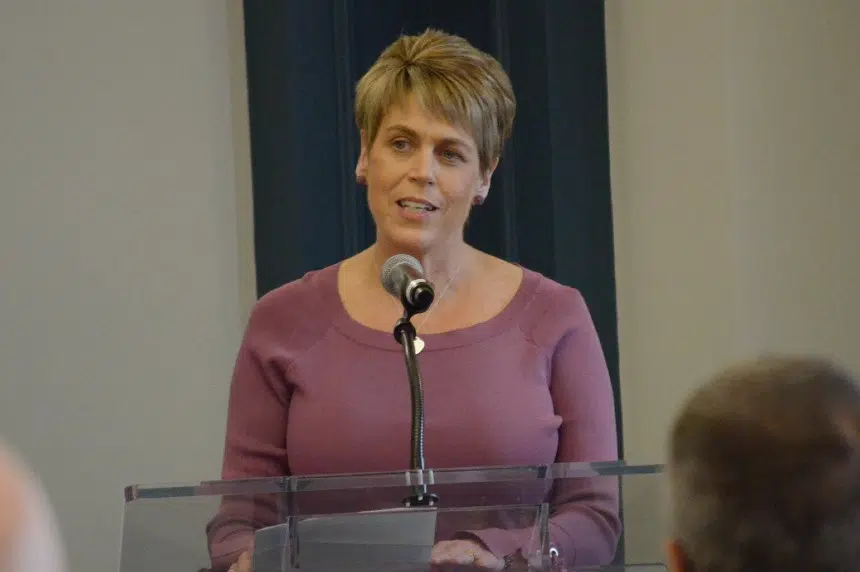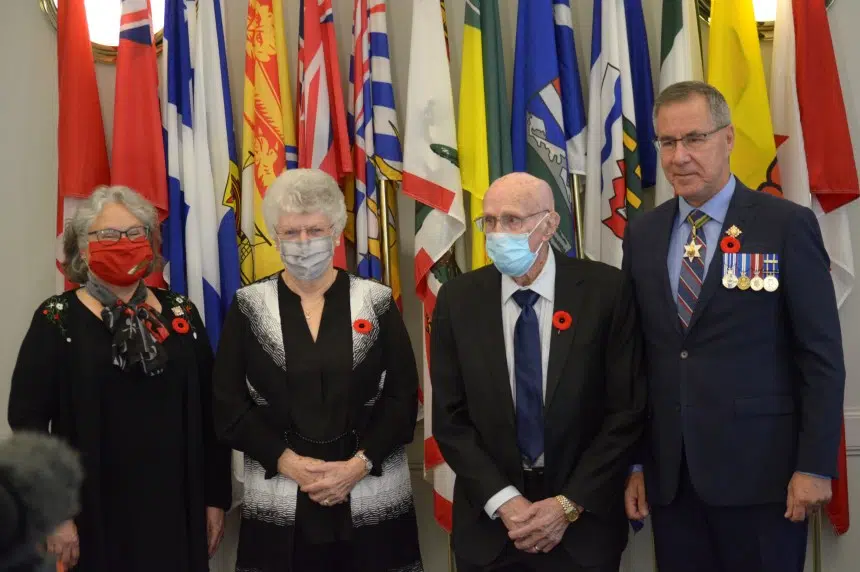This Remembrance Day will be all the more meaningful for Michelle Fisher after she finally got answers this year to the question of what happened to her great-uncle during the First World War.
Lance-Cpl. Morgan Jones Jenkins was an immigrant from Wales. Fisher said he came to Canada in search of a better life and attended the University of Manitoba.
Jenkins was not conscripted and was not obligated to fight but did so anyway, enlisting with the Princess Patricia’s Canadian Light Infantry.
“So (he) didn’t have to go to war for Canada. He could have just stayed in Canada and lived his life but decided it was important for him to go,” Fisher said during a ceremony at Government House on Thursday to kick off the Royal Canadian Legion’s annual poppy campaign.
Jenkins died in France during the Battle of Arras.
Lt.-Gov. Russell Mirasty, who was giving remarks during the ceremony, said the campaign was a bloody yet significant one in the outcome of the war.
“The Battle of Arras and Canal du Nord cost over 30,000 Canadian casualties but helped break the German army’s final defensive positions. After Canadian and other Allied troops crossed the Canal du Nord, the German forces were in full retreat,” Mirasty said.
On Aug. 28, 1918, Canadian troops were fighting along with the Americans and the British, suffering heavy casualties. Reinforcements finally arrived, allowing soldiers to get a break.
“The last thing that is known about Morgan on that fateful day was that his comrades saw him walking toward a building that had not yet been cleared. They called for him to come back. He rounded a corner and was never heard or seen again,” Fisher said.
Fisher’s great-grandparents had three sons perish in the First World War. But while two of the brothers have headstones in France, she said Jenkins was memorialized with a plaque on Vimy Ridge, as his remains were never found.
It turned out Jenkins was buried in France as an unknown soldier, his headstone with this engraving: “A soldier of the Great War, a Canadian regiment, known only unto God.”
“Until the day she died, my great-grandmother left the back porch light on in case he found his way home. Of course, he never did,” Fisher said.
In January, her family received a phone call from the Department of National Defence, informing them Jenkins’ remains had been found. Then in August, the Princess Pats notified the Regina-based family he had been killed in action, providing an official death notice.
Fisher knew little about Jenkins until this year. But after learning about her great-uncle and First World War history in general, she’s inspired by her family story.
“They actually did stop the Germans from advancing and it really was the final battle before the end of World War I,” Fisher said. “So our family is quite proud of the contributions he made in that war.”
Annual poppy campaign kicks off

Michelle Fisher speaks at Government House on Oct. 28, 2021. Fisher is the great-niece of Lance-Cpl. Morgan Jones Jenkins, whose remains were identified this year.
During a ceremony at Government House on Thursday, Mirasty accepted the first poppies of the year from the Royal Canadian Legion, kicking off the annual campaign.
“We will wear these poppies in remembrance of our own family members who have served and to honour all the men and women who have served in our military in times of conflict, on dangerous peacekeeping missions and domestic deployments,” Mirasty said.
“We owe our military people our deep gratitude for the sacrifices they have made to serve our nation.”
This year will mark a century since the poppy was officially adopted in Canada by the Great War Veterans’ Association — a predecessor to the Legion — as the symbol of remembrance. The annual poppy campaign is a fundraiser for the Legion, supporting programs for veterans and their families.
Fisher said she wasn’t born into a military family but her husband was in the navy. She’s familiar with the sacrifices of those who serve. Her husband spent a lot of time away and missed the birth of his child and Fisher was constantly worried he could be injured or killed.
“Remembrance Day was always a big deal and continues to be a big deal at our house. We’re always at the cenotaph every year. But this year was especially special because of our Uncle Morgan,” she said.
“I want people to realize that men and women died for the rights and freedoms we hold today.”







